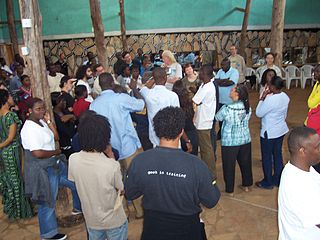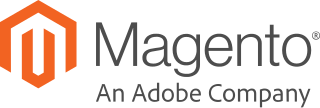The Association for Progressive Communications (APC) is an international network of organizations that was founded in 1990 to provide communication infrastructure, including Internet-based applications, to groups and individuals who work for peace, human rights, protection of the environment, and sustainability. Pioneering the use of ICTs for civil society, especially in developing countries, APC were often the first providers of Internet in their member countries.
Conexant Systems, Inc. was an American-based software developer and fabless semiconductor company that developed technology for voice and audio processing, imaging and modems. The company began as a division of Rockwell International, before being spun off as a public company. Conexant itself then spun off several business units, creating independent public companies which included Skyworks Solutions and Mindspeed Technologies.
Thoughtworks is a publicly-traded, global technology company with 49 offices in 18 countries. It provides software design and delivery, and tools and consulting services. The company is closely associated with the movement for agile software development, and has contributed to open source products. Thoughtworks' business includes Digital Product Development Services, Digital Experience and Distributed Agile software development.

Africa Source was a set of events, held in 2004 and 2006 in Namibia and Uganda respectively, to promote the use of Free/Libre and Open Source Software (FLOSS) among non-profit and non-governmental organisations. Africa Source was part of the wider "Source Camps" organised by Tactical Technology Collective (Tacticaltech.org) and its partners, and was also linked to the Asia Source and other parallel events held elsewhere.

Windows CardSpace is a discontinued identity selector app by Microsoft. It stores references to digital identities of the users, presenting them as visual information cards. CardSpace provides a consistent UI designed to help people to easily and securely use these identities in applications and web sites where they are accepted. Resistance to phishing attacks and adherence to Kim Cameron's "7 Laws of Identity" were goals in its design.
mySociety is a UK-based registered charity, previously named UK Citizens Online Democracy. It began as a UK-focused organisation with the aim of making online democracy tools for UK citizens. However, those tools were open source, so that the code could be redeployed in other countries.

European Digital Rights is an international advocacy group headquartered in Brussels, Belgium. EDRi is a network collective of non-profit organizations (NGO), experts, advocates and academics working to defend and advance digital rights across the continent. As of October 2022, EDRi is made of more than 40 NGOs, as well as experts, advocates and academics from all across Europe.

Ungana-Afrika, Swahili for "connect africa", is a non-governmental organisation based in Pretoria, South Africa that provides a wide range of ICT services for civil society within and outside of the continent. It aims to better empower civil society organisations, networks and related stakeholders, in terms of ICT capacity and resources, so they may more efficiently achieve their unique social missions.

Heather Ford is a South African researcher, blogger, journalist, social entrepreneur and open source activist who has worked in the field of Internet policy, law and management in South Africa, the United Kingdom and the United States. She is the founder of Creative Commons South Africa. She has studied the nature of power within Wikipedia and is a researcher at the University of Leeds.

Télécoms Sans Frontières (TSF) is an emergency technology non-governmental organization, which intervenes in the context of humanitarian crises, conflict zones and areas hit by natural disasters to set up satellite communication for the affected populations and humanitarian organisations.

Box, Inc. is a public company based in Redwood City, California. It develops and markets cloud-based content management, collaboration, and file sharing tools for businesses. Box was founded in 2005 by Aaron Levie and Dylan Smith. Initially, it focused on consumers, but around 2009 and 2010 Box pivoted to focus on business users. The company raised about $500 million over numerous funding rounds, before going public in 2015. Its software allows users to store and manage files in an online folder system accessible from any device. Users can then comment on the files, share them, apply workflows, and implement security and governance policies.

Magento is an open-source e-commerce platform written in PHP. Magento source code is distributed under Open Software License. Magento was acquired by Adobe Inc in May 2018 for $1.68 billion.
Information activism at libraries and among librarians began in the 1960s, when many libraries advocated for the information rights of their clients. Their activism projects thereafter extended beyond library walls to advocate for issues such as tenancy and labour rights. With the advent of new information technologies and the information explosion of the late 20th century, information activism expanded in scope to include people who utilize information in the service of advocacy.

A smart TV, also known as a connected TV (CTV), is a traditional television set with integrated Internet and interactive Web 2.0 features that allow users to stream music and videos, browse the internet, and view photos. Smart TVs are a technological convergence of computers, televisions, and digital media players. Besides the traditional functions of television sets provided through traditional broadcasting media, these devices can provide access to over-the-top media services such as streaming television and internet radio, along with home networking access.
Jigsaw LLC is a technology incubator created by Google. It used to operate as an independent subsidiary of Alphabet Inc., but came under Google management in February 2020. Based in New York City, Jigsaw is dedicated to understanding global challenges and applying technological solutions, from "countering extremism", online censorship and cyber-attacks, to protecting access to information. Its current CEO is Yasmin Green.

DigitalOcean Holdings, Inc. is an American multinational technology company and cloud service provider. The company is headquartered in New York City, New York, US, with 15 globally distributed data centers. DigitalOcean provides developers, startups, and SMBs with cloud infrastructure-as-a-service platforms.

Android Team Awareness Kit (ATAK) is an Android smartphone geospatial infrastructure and military situation awareness app. It allows for precision targeting, surrounding land formation intelligence, situational awareness, navigation, and data sharing. This Android app is a part of the larger TAK family of products. ATAK has a plugin architecture which allows developers to add functionality. This extensible plugin architecture that allows enhanced capabilities for specific mission sets.
Data activism is a social practice that uses technology and data. It emerged from existing activism sub-cultures such as hacker an open-source movements. Data activism is a specific type of activism which is enabled and constrained by the data infrastructure. It can use the production and collection of digital, volunteered, open data to challenge existing power relations. It is a form of media activism; however, this is not to be confused with slacktivism. It uses digital technology and data politically and proactively to foster social change. Forms of data activism can include digital humanitarianism and engaging in hackathons. Data activism is a social practice that is becoming more well known with the expansion of technology, open-sourced software and the ability to communicate beyond an individual's immediate community. The culture of data activism emerged from previous forms of media activism, such as hacker movements. A defining characteristic of data activism is that ordinary citizens can participate, in comparison to previous forms of media activism where elite skill sets were required to participate. By increasingly involving average users, they are a signal of a change in perspective and attitude towards massive data collection emerging within the civil society realm.

Jennifer Radloff is a South African feminist activist and a pioneer on Information and communications technology (ICT) for social justice. She works for the Association for Progressive Communications (APC) in the Women's Rights Programme and is a board member of Women's Net.













